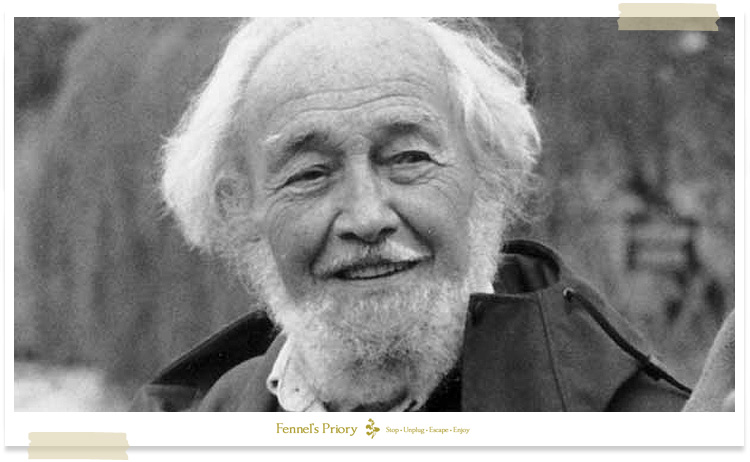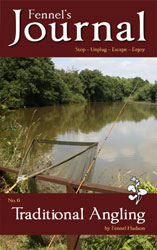
Seasonal and Traditional – The Mr Crabtree Way
Bernard Venables was the ultimate traditional angler. He was my friend and mentor, hence why Fennel's Priory is dedicated to him. His books are a constant reminder of how we should fish and live. Here's some of my favourite teaching from his books.
Mr Crabtree Goes Fishing, by Bernard Venables, appeals to many people on many levels. For a romantic like me, its main appeal is the utopian image of angling it conveys: of halcyon summer days, the accommodating (and ever-hungry) fish, the excitement of the chase, the joy of being beside water and the contemplation about how angling helps to keep us attuned to the changing seasons and goings-on in Nature. Such was Bernard Venables' skill as artist and writer. In fact, his skill and influence was so great that he was able to make those perfect summer dawns last for over 60 years. "The morning," wrote Bernard, "has such a fragile loveliness that it seems far removed from ordinary reality."
The book is ‘a guide to fishing round the year’. It’s about seasonality, nature, and the diverse sport to be had through the year.
The traditional seasons of angling
The traditional coarse fish closed season (15th March to 15th June inclusive) was introduced in 1923. But, due to political and economic pressures, was abolished on stillwaters and canals in 1995. (The exception being Sites of Special Scientific Interest, which remain closed during the spring.)
The closed season, like those for other sporting species, was designed to protect a hunted quarry when it is most vulnerable – in the lead up to, and act of, reproduction. But the coarse fish closed season has been abolished for nearly twenty years, far longer than the new generation of anglers has been alive. They've never experienced a closed season on stillwaters or canals. They're encouraged to fish for coarse fish all-year-round. Tackle manufacturers and lake owners smile, and ring their cash registers. And the fish take cover. Young anglers don't know any different. They were born into the world of modern angling, where coarse fish are targeted all-year-round.
True sportsmen and sportswomen should not need a law to prevent them from doing what’s obvious. They should not want to fish for species that are in a delicate state (this applies equally to species such as carp that often spawn during the fishing season). Leave those species to spawn, and fish for something else instead. Just as Mr Crabtree did.
Take pike for example. In Mr Crabtree, Bernard Venables describes pike as a late autumn and winter fish. "It always grieves me," he says, "to see anglers fishing for pike during the summer. A pike is only a poor thing then, still exhausted from spawning. If it is hooked it cannot fight as it should. Pike should be left alone until October." Hence why we traditionalists hold dear to the iconic Crabtree images of fishing for pike in winter, trout in spring, tench and carp in summer, and perch and barbel in autumn.
So, in Crabtree, the seasons take centre stage. And what better way to illustrate the changing seasons than to show the 'movement' of water?
The beauty of rivers
Lakes are featured in Mr Crabtree Goes Fishing, but rivers take centre stage. And why not? It’s possibly the best way to illustrate the diversity of angling at different times of year - from winter floods to summer lows.
Rivers are generally wilder and less manicured than lakes, and a stretch of river is not contained like the boundaries of a lake. The fish are free to roam, so there's greater likelihood of hooking something unexpected. And because of this, rivers have a greater air of mystery. This mystery is amplified in smaller rivers, where a disproportionately large fish might swim into view. Rivers can be meandering lowland types, or tumbling upstream versions. They trickle or roar; but each has more energy than a lake. Which gives them 'presence' beyond the allure of a static reflection. It's this 'current of life' that makes rivers so appealing.
When I think of rivers, and especially what the Mr Crabtree book taught me, I think of them first and foremost as being the most special form of water. This isn't so much said in the book, rather it is implied. The Crabtree's begin their year on a river that is flooded with winter spate. It would have been easier to have fished a stillwater, but they did not. They sought to 'read the river' and find the fish sheltering from the current. And in doing so, we are informed about the seasonality of angling. Rivers, in contrast to lakes, reservoirs and canals, are the most seasonal form of water. Their nature changes most dramatically between winter flood and summer drought. Lakes, in comparison, exhibit more subtle changes.
Carp fishing – as it should be
Modern carp fishing is as far removed from seasonal and traditional angling as could be imagined. If you want a guide to how carp fishing – indeed traditional angling – should be done, then read Bernard’s ‘Mr Crabtree Goes Fishing’ and ‘The Gentle Art of Angling’ (possibly my favourite angling book).
Bernard Venables wrote that in carp fishing, history is shaping before our eyes. Writing in 1955 he said, "Carp fishing has as yet no shibboleths, no dogmas; its followers are all at the stage of active and unprejudiced enquiry. ...the effect on the world of fishermen was even more pronounced; it stung into being a storm of quite extraordinary violence. This was not Fair Fishing, the angry critics cried. ...The Carp Catchers, it was said, were Unsporting. ...By now an excitement was loose among anglers. Criticism dwindled and a new religiousness grew. Carp were attainable; the mystical wonderful carp was for everyone".
Carp fishing, more than any other form of angling, highlights the polar extremes that exist between traditional 'Mr Crabtree-style' pleasure fishing and modern 'bigger is best' specimen hunting. While Mr Crabtree's approach to angling encourages us to relax, be still, and contemplate our good fortune at being by the waterside, modern carp angling has a seriousness (almost desperateness) in its being. It 'thinks', using logic, science and technology, to design the downfall of great fish; whereas traditional angling 'feels' and uses intuition to connect with Nature.
Which school of angling – traditional or modern – do you think demonstrates the greatest skill? It's a debate in itself. But to the casual observer, a traditionalist like me would appear to be someone seeking to escape the urgency of the modern world, with little concern about catching fish; whereas the modern carp angler would appear to have almost military seriousness in his or her 'campaign' to catch. (Or the observer might think that the tweedy-type traditionalist is just a Nancy Boy indulging in some dressed-up escapist fantasy, and that the modern carp angler is the one who's staying true to the purpose of fishing and the technological age in which we live.) But what happens when both schools are confronted by the impatient restlessness of youth?
The conflict of 'old versus new' presents the biggest opportunity for this series of Fishing in the Footsteps of Mr Crabtree. That is, to compare and contrast both the traditional and modern schools and, in staying true to the spirit of Bernard Venables, to take the side of tradition. It's a perfect chance to show the romance and atmosphere of carp fishing, rather than to go into the cold mechanics of deceiving a big fish. This was my biggest hope as I waited for the Carp programme to begin. Would it portray classic and traditional carp fishing, or would it just be another 'me-too' carp programme where the bleeping of bite alarms shatters the illusions of myth and timelessness?
But it's not really about the tackle and tactics. It's about mind set. Bernard Venables concluded as such in his book The Gentle Art of Angling: "However much he [the angler] gives himself to the legitimate pleasures of theory, debate, and precious tight-rope balancing, he should never for a moment let these interfere with the pleasure of fishing as he wishes to fish, in whatever approved or unapproved fashion. Fishing is worth no more than its pleasure". What he means is this: it doesn't matter how you fish, so long as you enjoy it.
 If you like this blog, you'll like Fennel's book Traditional Angling.
If you like this blog, you'll like Fennel's book Traditional Angling.
Please also subscribe to the Fennel on Friday weekly email. You'll receive either a blog, video or podcast sent to you in time for the weekend.



